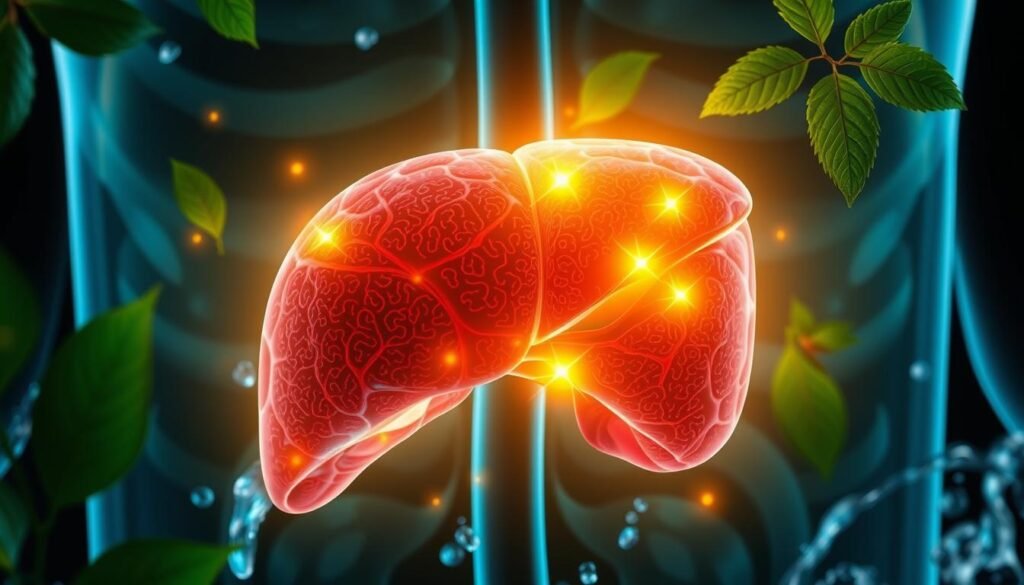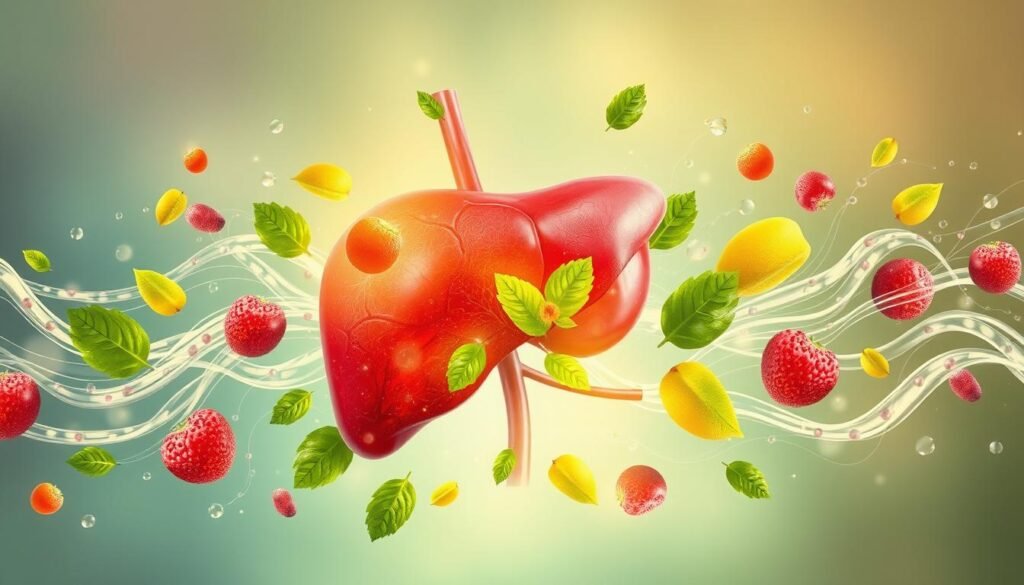Did you know that the liver is the biggest internal organ? It can weigh up to 4 pounds. It’s about the size of a football. This amazing organ helps with digestion, metabolism, and getting rid of toxins. Knowing how to tell if your liver is healthy is important. It helps you stay well and stops serious health problems. This article will show you eight signs that mean your liver is doing well. It also tells you why it’s important to catch problems early and to keep an eye on your liver’s health regularly.
Key Takeaways
- The liver is crucial for digestion, metabolism, and detoxification.
- Understanding the signs of a healthy liver can prevent serious health complications.
- Regular monitoring of liver function is essential for early detection of issues.
- Common symptoms of liver problems include fatigue, jaundice, and abdominal pain.
- Maintaining a healthy lifestyle is key to supporting liver health.
Understanding the Liver’s Role in Overall Health
The liver is key for our health, working hard to keep us well. It does many jobs, like digesting food and managing nutrients that we get from what we eat. Learning about what the liver does shows us how important it is to keep it healthy.
The functions of the liver in digestion and metabolism
The liver is a big deal. It makes up about 2% of what an adult weighs and does over 500 jobs to keep us healthy. It creates bile for digestion, helping our bodies get rid of waste and break down fats. Plus, it keeps our blood sugar levels right and saves important vitamins.
Importance of liver detoxification capacity
Detoxifying is one of the liver’s big jobs because it cleans out toxins from our blood. The liver breaks down drugs in two steps: phase I and phase II. The part of the liver called Zone III plays a huge role in getting rid of toxins. If it doesn’t work right, toxins can build up and make us sick.
So, the liver helps digest food, manage nutrients, and clean out toxins. This makes it super important for our health. A healthy liver means better digestion, metabolism, and overall well-being. That’s why taking care of our liver is essential.
What Are the Signs of a Healthy Liver?
Knowing the signs of a healthy liver helps people keep themselves in good shape. The liver is key, doing over 500 important tasks. Spotting the signs of a good liver, as well as early warning signs of trouble, is crucial.
Overview of key indicators of liver health
Important health markers for the liver include:
- Normal liver enzyme levels
- Appropriate bilirubin levels
- Healthy albumin levels
- Effective prothrombin time measurements
If these factors are off, it might hint at liver problems. This should not be ignored and needs quick action.
Why recognizing these signs early is beneficial
Finding liver problems early can save a lot of trouble. It means getting the right help fast, avoiding serious issues like hepatitis or cirrhosis. Starting treatment early can make healing quicker. By knowing what signs to look for, people can get help when it’s truly needed. Learning about liver pain symptoms is key due to the 4.5 million people in the U.S. with liver disease.

Signs of a Healthy Liver
A healthy liver is vital for your overall wellness. It shows through clear biochemical markers. These markers give us insights into how the liver is doing and any complications.
Normal bilirubin levels and their significance
Having normal bilirubin levels means the liver is processing waste well. High levels can show liver problems or bile duct issues. It’s important to keep these levels right to ensure good health.
Healthy liver enzymes and their importance in liver function
Liver enzymes like ALT and AST are important for checking liver health. Normal enzyme levels mean a healthy liver. High levels could mean damage or inflammation. It’s good to test these regularly to catch any problems early.
How albumin levels indicate liver health
Albumin levels show how well the liver is working in making proteins. A good level of albumin keeps fluids balanced and transports hormones. Low levels could hint at liver disease or other health issues. So, keeping an eye on albumin is key.
The role of prothrombin time in assessing liver function
Prothrombin time measures how the liver handles clotting factors. A long prothrombin time can mean serious liver problems or blockages. Testing this regularly helps understand liver health and avoid complications.

Regular liver function tests are super important. They can help manage liver issues more effectively if caught early. Knowing what these indicators mean is a big step toward a healthy liver. For more insights, visit this guide.
Indicators of Proper Detoxification Capacity
The liver is key to keeping us healthy, especially by getting rid of toxins. A working liver helps us digest better by removing bad stuff from our system. When it’s doing its job right, we aren’t bogged down by digestive problems, making daily life easier.
How detoxification impacts digestive health signs
Detox is crucial for digestion. A healthy liver gets rid of toxins from what we eat, drink, and come across in the environment. Signs of a good liver function include:
- Stable energy levels, showing our body’s good nutrient use.
- A balanced appetite, meaning metabolism and nutrient intake are on point.
- Reduced bloating and discomfort, signs that digestively, we’re doing okay.
Signs of effective toxin elimination
Noticing how well toxins are cleared can hint at liver health. Clear indicators are:
- Clear skin, since a detoxing liver fights off outbreaks and blemishes.
- Regular bowel movements, showing our digestion and toxin removal are working fine.
- Improved mental clarity, which means our brain benefits from fewer toxins.
Understanding these signs shows the liver’s role in our overall health. By focusing on detox ability, we can live a healthier and fuller life.

Physical Symptoms Reflecting Liver Health
There are several signs that show how healthy your liver is. Spotting these signs early is key for getting the right treatment. It also helps people know more about their health.
Understanding jaundice indicators
Jaundice makes the skin and eyes turn yellow. It happens when there’s too much bilirubin in the blood. If the liver can’t work right, bilirubin builds up, showing there might be liver issues. For more info on liver health, check out this informative resource.
Effects of swelling in the abdomen on liver function
When the belly swells up, it’s often because of ascites. This condition suggests serious liver diseases like cirrhosis. If the liver can’t handle fluids well, it leads to swelling. Watching out for this is crucial for spotting liver problems.
Recognizing unusual bruising and its implications
Getting bruises easily can mean the liver is not working properly. The liver creates proteins that help blood clot. If it’s not doing its job, small injuries can cause big bruises. This is a clear sign to check on liver health.
Routine Monitoring Through Liver Function Tests
Liver function tests are key for checking liver health. They play a big role in figuring out how well the liver works and finding potential problems. By measuring substances the liver makes, doctors can keep an eye on liver health.
What liver function tests can reveal about liver health
These tests offer crucial insights by measuring specific enzymes and proteins. There are common tests like ALT, AST, and ALP among others. Each test gives important info. This includes:
- Screening for infections: Helps detect liver infections, such as hepatitis.
- Monitoring conditions: Evaluates diseases like viral or alcoholic hepatitis for treatment effectiveness.
- Identifying serious illnesses: Assists in recognizing issues like cirrhosis.
- Checking medication effects: Monitors potential side effects from prescribed drugs.
Understanding liver inflammation markers
Liver inflammation markers are key indicators of liver problems. High levels can mean conditions like fatty liver disease or hepatitis. Routine tests help spot these marker abnormalities early. This lets doctors act fast. Yet, it’s crucial to look at test results with other assessments and symptoms. Not just liver disease can change test results.
| Test | Standard Range |
|---|---|
| ALT | 7 to 55 U/L |
| AST | 8 to 48 U/L |
| ALP | 40 to 129 U/L |
| Albumin | 3.5 to 5.0 g/dL |
| Total Protein | 6.3 to 7.9 g/dL |
| Bilirubin | 0.1 to 1.2 mg/dL |
| GGT | 8 to 61 U/L |
| LDH | 122 to 222 U/L |
| PT | 9.4 to 12.5 seconds |
Supporting a Healthy Liver
To keep your liver healthy, start by choosing the right foods, exercising, and steering clear of bad substances. Smart lifestyle decisions can boost your liver’s work and your overall health.
Healthy diet choices to promote liver wellness
Eating well is key for a healthy liver. Include lots of fruits, vegetables, whole grains, and lean proteins in your meals. This mix supports the liver’s cleaning process.
Antioxidant-rich foods like berries and green veggies shield liver cells. They play a big role in keeping your liver in good shape.
Importance of regular exercise for liver function
Staying active helps your liver a lot. Regular exercise keeps your weight in check, cutting the risk of fatty liver disease. It also improves blood flow, aids in breaking down foods, and keeps your insulin levels balanced, benefiting your liver.
Avoiding harmful substances to protect the liver
To keep your liver safe, avoid things that can hurt it. Too much alcohol can cause liver issues, like fatty liver disease and scarring. Try to limit your exposure to chemicals in household products too.
Being aware and careful about drug use and practicing safe sex are important. They can prevent liver infections, like hepatitis, that damage liver health.
When to Seek Medical Attention
Spotting liver problems early can really help with treatment and recovery. People often miss the little signs. Paying attention early on can make a big difference. Knowing the signs of liver problems is key to fixing them early. This helps keep you healthy.
Recognizing early signs of liver issues
Knowing what to look out for is the first step to keeping your liver healthy. Some common signs are:
- Jaundice (yellowing of the skin and eyes)
- Persistent fatigue affecting daily life
- Unusual bruising and bleeding
- Abdominal discomfort or pain
- Dark urine and lighter-colored stools
- Chronic itching
These signs can show different liver problems, from fatty liver disease to viral hepatitis. Finding these early can lead to a doctor’s visit. This can help you get tests and the right treatment sooner.
Importance of timely consultation with healthcare professionals
Seeing a doctor for liver symptoms is key to getting the right diagnosis and treatment. Doctors can do tests, like liver function tests or imaging, to check your liver. Acting fast is important. Some conditions, like cirrhosis or liver cancer, don’t show big signs early on.
About 4.5 million adults in the United States have liver disease. This shows why knowing about liver health is important. Getting help quickly for liver problems can prevent worse issues. This makes getting help in time very important for your liver’s health.
Conclusion
A healthy liver is vital for good health. Knowing the signs of a healthy liver helps people care for it. By eating well and exercising, you can boost your liver health. This also cuts down the risk of liver diseases.
It’s important to catch liver problems early. Symptoms like feeling tired, yellow skin, and swelling in the belly are warning signs. Seeing a doctor quickly can mean better treatment. Sometimes, the liver can fix itself in a few weeks. To learn more, check out understanding liver health.
Preventing liver issues is key to avoiding serious diseases like cirrhosis or liver cancer. Paying attention to liver health leads to a better future. The liver is the body’s largest organ and can heal itself. So, taking good care of it is not just good—it’s crucial.